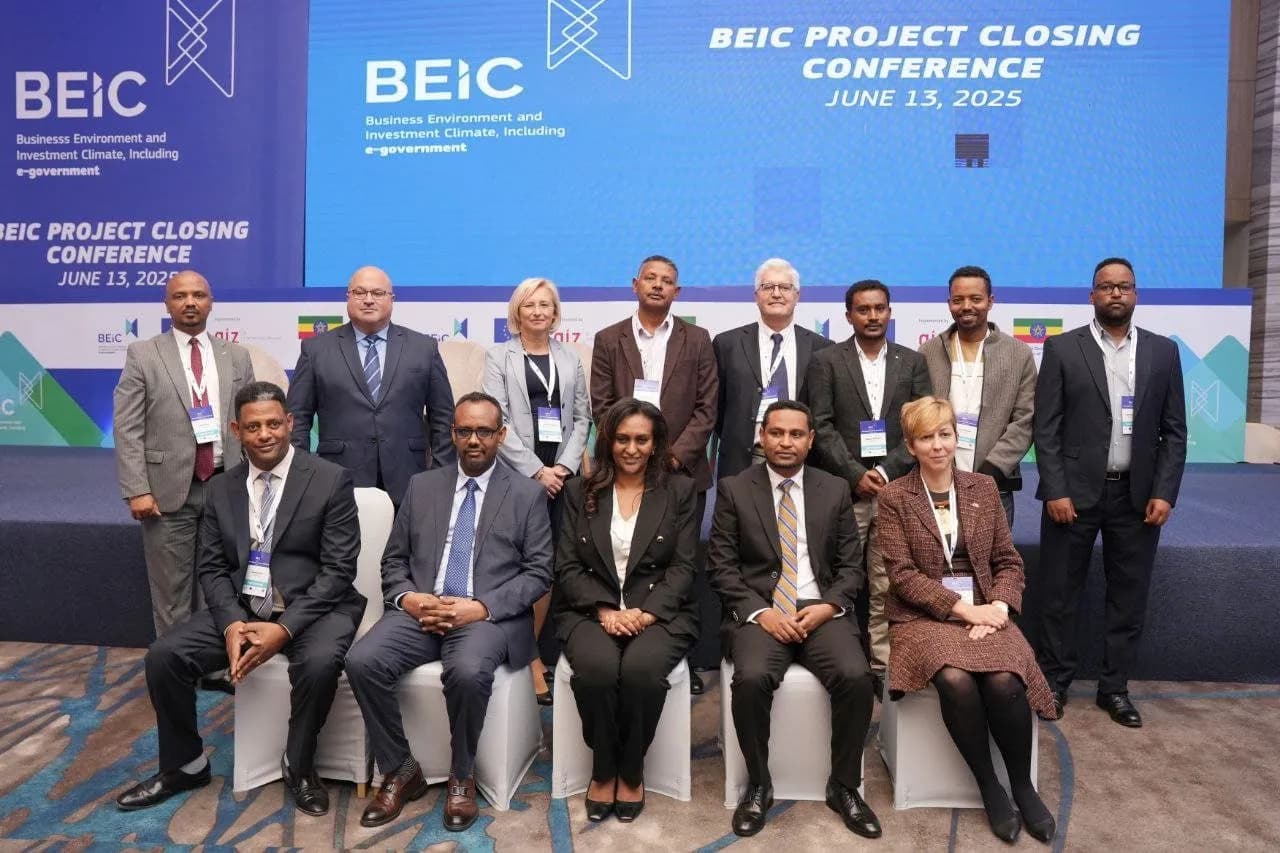Progress for 0 ad
Progress for 1 ad
Progress for 2 ad
Progress for 3 ad


Etenat Awol
Addis Ababa, Ethiopia

An ambitious, four-year EU-funded project to roll out a robust e-governance infrastructure that reduces the unease of doing business in Ethiopia concluded late this week. The Business Environment and E-Government Project (BEIC), a technical and institutional collaboration, marked its ceremonial close at the Skylight Hotel.
Certain components of the €7.2 million program will continue to phase out over the next three months, allowing the beneficiary public institutions to navigate the digital corridors on their own.
Implemented by GIZ in collaboration with McKinsey & Company, the Project set out to digitize Ethiopia’s convoluted and paper-intensive business bureaucratic ecosystem. One of the most ambitious undertakings under BEIC was the development of the Integrated Company Creation Journey (ICCJ). Designed to consolidate over ten disparate processes into a unified, paperless workflow, the ICCJ platform promises to collapse Ethiopia’s notoriously bureaucratic business registration procedures into a streamlined digital experience.
According to Elie Sawaya, Key E-Government Expert at BEIC, the platform is technically complete and ready for deployment. However, it remains offline, pending security clearance from the Information Network Security Agency (INSA).
“Everything is ready,” Sawaya told Shega. “But because this is a core application used by government institutions, INSA must conduct critical security validations. Once cleared, the platform will go live and simplify business creation across the country.”
Representatives from several public institutions currently digitizing their operations attended the closing ceremony and reflected on the projects' progress, which included 1,200 civil servants trained and millions of online processes implemented. The Ministries of Revenue (MoR), Trade & Regional Integration (MoTRI), Justice (MoJ), Innovation and Technology (MiNT), and the National Bank of Ethiopia (NBE) were key stakeholders throughout the four-year project. However, as Ethiopia contends with a 169th ranking in the latest UN E-government index, cross-cutting measures to streamline digital processes remain critical.
The Trade Ministry has already begun digitally transforming other core processes. Tasks like issuing competency certificates and contract exports have been digitized through the OTRLS system. It has also onboarded institutions like the Ministry of Agriculture and the Environmental Protection Agency. Training in IT service management and software development looks to ensure the ministry’s staff are prepared to sustain and upgrade the systems post-BEIC.
Elsewhere, BEIC supported the Ministry of Revenues in fully digitizing its e-filing system. More than 3 million filings have been processed digitally. Taxpayers can now submit forms, request refunds, and engage with the system without stepping into an office. The Ministry also received infrastructure support and cybersecurity training grounded in frameworks such as ITIL and COBIT, according to Elie.
At the regulatory level, BEIC worked with the Ministry of Justice and the Ministry of Innovation and Technology to launch two pivotal platforms: an e-Consultation Portal to enable public feedback on draft legislation, and an e-Legislation Portal to provide open access to the country’s laws. A Public-Private Dialogue (e-PPD) platform was also developed with ECCSA and MoTRI to institutionalize consultation between business leaders and policymakers.
Despite this progress, the ultimate test lies in implementation. As of mid-2025, the ICCJ, one of the core innovations of the BEIC project, remains dormant. Without INSA clearance, entrepreneurs must still navigate fragmented, paper-based registration processes.
According to Alberto Gomez (PhD), Team Lead for BEIC, the project’s challenges extended beyond technical hurdles.
“The biggest obstacle was securing leadership buy-in. We can design the best systems, but ownership and political will are necessary for implementation,” he noted.
Connectivity and digital literacy gaps also limit adoption. Despite the tools in place, only about a third of Ethiopians have internet access. Even within ministries, low digital fluency can slow integration. BEIC’s response was to focus on sustainability using open-source software like Laravel and hosting systems on the Ministry of Innovation and Technology’s servers. But infrastructure alone isn’t enough to ensure impact.
“All platforms adhere to the national legal framework. While digital literacy remains a barrier, this isn’t unique to Ethiopia. Even in the EU, similar challenges exist. Building human capital takes time,” the project lead told Shega.
BEIC unfolded alongside Ethiopia’s larger digital transformation agenda, including the Digital Ethiopia 2025 strategy and the country’s participation in regional frameworks like Smart Africa. It also came on the heels of Ethiopia’s historically poor showing in the World Bank’s now-defunct Ease of Doing Business Index, where it ranked 159 out of 190 countries in 2020. Prime Minister Abiy Ahmed recently unveiled an ambitious e-governance project dubbed Mesob that should be able to integrate 41 public services from a single digital hub.
With the BEIC project drawing to a close in September, responsibilities will now shift entirely to Ethiopia's government institutions. Whether they have the internal capacity, inter-agency coordination, and political support to maintain and expand BEIC's contributions remains and open question.
👏
😂
❤️
😲
😠

Etenat Awol
Etenat holds a degree in Journalism and her master's in Public Relations. Previously, she served as a university lecturer and has five years of experience in communications, media, digital marketing, and consulting.
Your Email Address Will Not Be Published. Required Fields Are Marked *